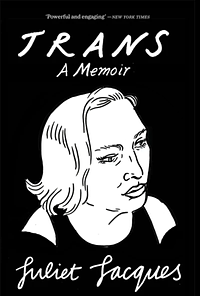You need to sign in or sign up before continuing.
Take a photo of a barcode or cover
Absolutely loved this and couldn't recommend it more, definitely going to be distractedly reading Juliet's essays over the coming weeks at work. Just found one where she is reviewing Chris Kraus' latest book, nicely combining many interests. If I sound incoherent just trust me on this - go buy this book from Verso books and read it for yourself.
I very much want to support trans creators but I also literally fell asleep while reading this. I admit that I'm sleep deprived and that the library in Zagreb is incredibly cozy but still.
So I think what you can really take from this book is that, well, trans people live as boring of lives as cis people. Juliet tells her story and some moments are written amazingly but most of the book lacks a plot. Juliet talks about employment and financial struggles but these things aren't with a specific trans perspective. They're just the usual things a young person with a liberal arts degree faces. Which, is challenging and unfortunate but I can't say that that's worth reading about.
I think the biggest problem in this book is that the writing reads like an article. So the bits where she's talking about various gender related media are great but article style writing doesn't work well when you're telling your personal story.
Nonetheless, I felt the parts when she realized she's trans were really well written. I loved how her family eventually supports her and how the queer community helped her.
I also didn't like how anti-feminist she comes across. Trans issues are clearly feminist issues and the fact that she experienced some negative things doesn't really excuse portraying feminism as anti-trans.
Janet Mock's book is a better read if you're looking to learn about a trans woman's life but this book has an interesting perspective as it's based in the UK and describes the LGBT+ community quite a few years ago.
All in all, I think this book is nice but yeah, I can't say that it is more.
What I'm Taking with Me
¬ Journalism is a scary field.
¬ That scene when she passes as a woman but still gets harassed is so important and sad.
¬ I feel like if I ever chose to physical transition, I'll come back to this book.
So I think what you can really take from this book is that, well, trans people live as boring of lives as cis people. Juliet tells her story and some moments are written amazingly but most of the book lacks a plot. Juliet talks about employment and financial struggles but these things aren't with a specific trans perspective. They're just the usual things a young person with a liberal arts degree faces. Which, is challenging and unfortunate but I can't say that that's worth reading about.
I think the biggest problem in this book is that the writing reads like an article. So the bits where she's talking about various gender related media are great but article style writing doesn't work well when you're telling your personal story.
Nonetheless, I felt the parts when she realized she's trans were really well written. I loved how her family eventually supports her and how the queer community helped her.
I also didn't like how anti-feminist she comes across. Trans issues are clearly feminist issues and the fact that she experienced some negative things doesn't really excuse portraying feminism as anti-trans.
Janet Mock's book is a better read if you're looking to learn about a trans woman's life but this book has an interesting perspective as it's based in the UK and describes the LGBT+ community quite a few years ago.
All in all, I think this book is nice but yeah, I can't say that it is more.
What I'm Taking with Me
¬ Journalism is a scary field.
¬ That scene when she passes as a woman but still gets harassed is so important and sad.
¬ I feel like if I ever chose to physical transition, I'll come back to this book.
Trans is a memoir by a trans woman. It was enlightening to see how Juliet’s journey unfolded - from a gay man who sometimes dressed as a woman, through living as a woman all the time, to the process of reassignment surgery itself. There was lots I hadn’t thought about before - learning to apply makeup, the role of voice coaching, the sometimes fraught process of buying clothes, choosing your own name. I was also interested to see the role movies, books and music played in Juliet’s journey.
In July 2012, aged thirty, Juliet Jacques underwent sex reassignment surgery—a process she chronicled with unflinching honesty in a serialised national newspaper column. Trans tells of her life to the present moment: a story of growing up, of defining yourself, and of the rapidly changing world of gender politics.
I saw Juliet at the Edinburgh Book Festival and found her discussion about the book really interesting - that she wanted to tell her own story but also offer a jumping off point in terms of culture - film, music, etc - for trans people. Growing up, it could be sparse and difficult to find; nowadays, the internet makes everything overwhelming in volume.
Frank, with no frills. Trans: A Memoir is Juliet's journey, the good, bad, angry and everything else laid as it is.
I saw Juliet at the Edinburgh Book Festival and found her discussion about the book really interesting - that she wanted to tell her own story but also offer a jumping off point in terms of culture - film, music, etc - for trans people. Growing up, it could be sparse and difficult to find; nowadays, the internet makes everything overwhelming in volume.
Frank, with no frills. Trans: A Memoir is Juliet's journey, the good, bad, angry and everything else laid as it is.
Very well-timed, with Greer's antics at the end of last year, this contains both an enormously useful criticism of the tensions between radical feminism and trans issues, played out in the UK press and in a very valuable bibliography, and an explicit and successful attempt to veer as far (within her brief) as possible from the traditional first person transition-based narrative. Highly recommended.
informative
reflective
medium-paced
I really enjoyed this memoir and how it deftly incorporated theory and trans* history, exploring controversial topics with honesty, nuance, and humor, and feeling personal without being too voyeuristic.
What an absolutely wonderful memoir. Not only was it interesting to follow the author's life - the way we follow it is also incredibly satisfying in its brilliant structure. I am an absolute sucker for memoirs that mix life writing with theory and a wider cultural history. The author does this incredibly well, breaking up her stories of mental health, work, and gender identity with fascinating information about everything from politics to literature. It is also generally a very intertextual memoir, another favourite type of writing for me; I now have a long list of queer media that I will happily explore.
However, perhaps my favourite aspect of this memoir is how working class it is. It is so easy for people who work in the arts and who write on gender and sexuality to fall into liberal discourse and shy away from anything political that isn't identity based, and to forget completely about their own class privilege. This memoir instead reveals an author who is poor and angry with the government in a way that doesn't sound fake or repetitive; she does not just make exasperated remarks about the Conservatives, but instead offers genuine criticism of parties and politicians. None of this makes her memoir boring, nor does it distract from her personal narrative - instead, it builds on it, and makes for an enjoyable reading experience that feels true and honest.
If you enjoy intertextuality, counterculture, and class conscious writing on gender, I would highly recommend picking this up.
However, perhaps my favourite aspect of this memoir is how working class it is. It is so easy for people who work in the arts and who write on gender and sexuality to fall into liberal discourse and shy away from anything political that isn't identity based, and to forget completely about their own class privilege. This memoir instead reveals an author who is poor and angry with the government in a way that doesn't sound fake or repetitive; she does not just make exasperated remarks about the Conservatives, but instead offers genuine criticism of parties and politicians. None of this makes her memoir boring, nor does it distract from her personal narrative - instead, it builds on it, and makes for an enjoyable reading experience that feels true and honest.
If you enjoy intertextuality, counterculture, and class conscious writing on gender, I would highly recommend picking this up.






